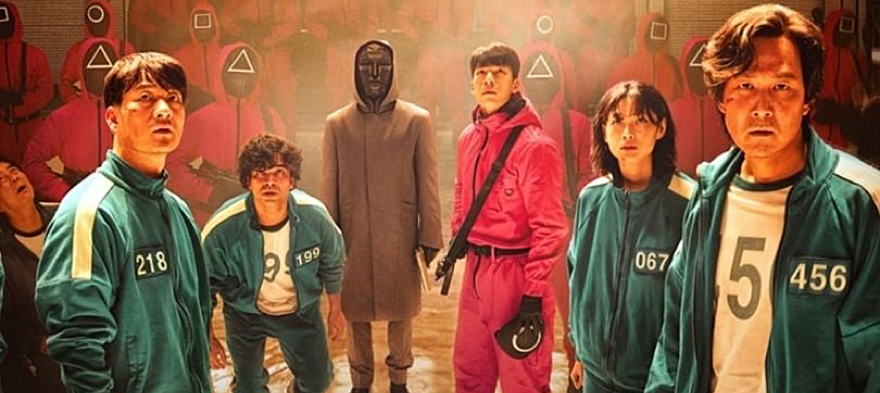
Oct 11, 2021 12:00:00 AM
As a teacher, I typically find out about new things from my students. By the time something starts trending on social media, I have likely already been exposed to it via my students. The latest hit show “Squid Game” is no exception.
My students use Chromebooks and have a fair amount of free time throughout the week where they can use them for watching shows or playing games. But of course, that is not the only time they try to get away with recreational use. While in class, I frequently have a program called "Hapara" up on my screen that allows me to see their online tabs, and if need be, close them.
About two weeks ago, I noticed that the most common tab I was closing out was “Squid Game.” I assumed it was an actual game the first time and went on about my business. When I figured out it was a show, I became interested … especially because I had seen several students watching it who do not typically have overlapping interests. One day, I decided to peek over a student’s shoulder and see what it was before I closed it out. I saw two Asian characters having a conversation and there were subtitles at the bottom. The student’s shoulder I looked over, let's just call him Keyshawn, saw me looking and actually started explaining the show to me, which took some audacity considering he was supposed to be reading about the Tundra biome at the time.
Keyshawn: They like these people who are playing a game for all this money. But if they lose, they die.
Me: So, it’s like a game show?
Keyshawn: No it’s a regular show, but there is a game on it, and they die if they lose. See look…
He rewinds back to a part where characters met their untimely demise. I noticed that this was extremely violent, and he shouldn’t be watching this. I also noticed that the dialogue in this part of the show was between Asian characters and subtitled.
Me: Is this show from a different country.
Keyshawn: Yeah it’s from North Korea…
Obviously, the show isn’t from North Korea, but we had talked about them before and one of the characters is from North Korea so he was probably confused.
Keyshawn: That’s why I got to watch it with the words on there.
Me: You’ve been watching the whole show like this? With the words.
Keyshawn: Yeah. I have to. Some things still in that language though. That’s why I have the translate tab open. They call money won over there.
There is a key part about Keyshawn that I didn’t mention before. Supposedly, he can’t read, at least not on grade level and well below the level of dialogue I saw flashing across the screen when I was watching the show. It is a fight to get him to read in class. Remember, he was supposed to be reading when I caught him watching the show. [pullquote]Though he struggles and refuses to read in class, he is apparently willing to struggle through this TV show and even use a translation dictionary on the side.[/pullquote] And he learned some Korean, too!
This confirms what I have always known: A lot of our kids who “can’t” and “won’t” read simply are not being reached by the texts we provide in school. While this phenomenon has been more pronounced with “Squid Game," I have noticed it with anime in the past, too. This style of reading engagement appears to be an untapped resource when it comes to literacy.
I neglected to tell Keyshawn that there is a way to switch the audio to English on Netflix … on purpose. Another student did eventually tell him, but he kept it off.
And I did end up closing the tab. The show is graphic and whether or not it is appropriate for a 14-year-old to watch is between him and his parents — and certainly not a conversation I want to be forced to have. However, [pullquote]I am glad that I caught him breaking the rules that day because now I know that his reading ability is more than his DIBELS score.[/pullquote]
Andrew Pillow is a fifth grade social studies teacher at KIPP Indianapolis, a charter school where he has taught since 2011. He is also a former Teach Plus Policy Fellow and he has taught technology and social issues.
The story you tell yourself about your own math ability tends to become true. This isn’t some Oprah aphorism about attracting what you want from the universe. Well, I guess it kind of is, but...
If you have a child with disabilities, you’re not alone: According to the latest data, over 7 million American schoolchildren — 14% of all students ages 3-21 — are classified as eligible for special...
The fight for educational equity has never been just about schools. The real North Star for this work is providing opportunities for each child to thrive into adulthood. This means that our advocacy...
Your donations support the voices who challenge decision makers to provide the learning opportunities all children need to thrive.
Ed Post is the flagship website platform of brightbeam, a 501(c3) network of education activists and influencers demanding a better education and a brighter future for every child.
© 2020–2024 brightbeam. All rights reserved.
Leave a Comment